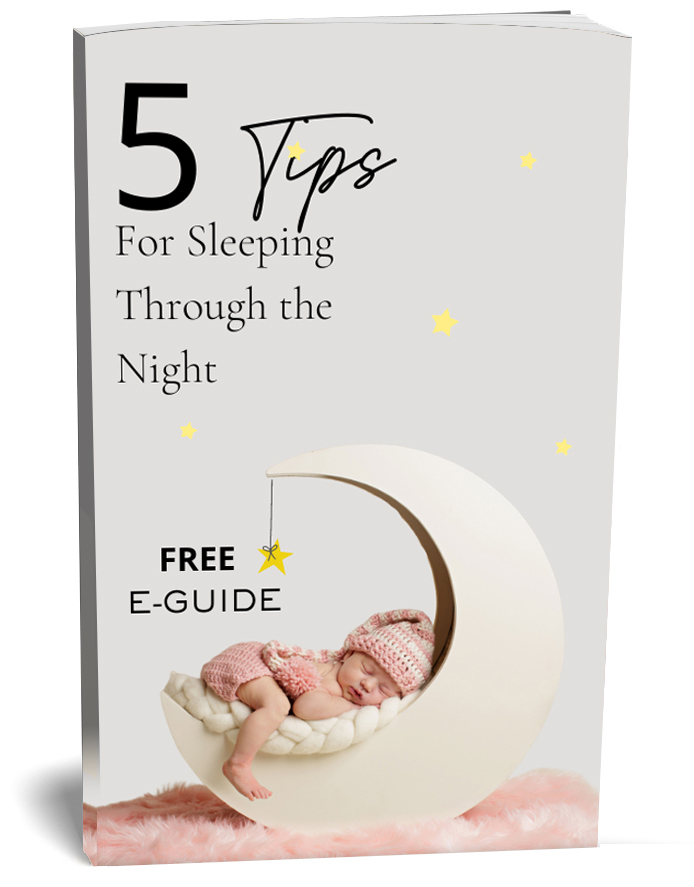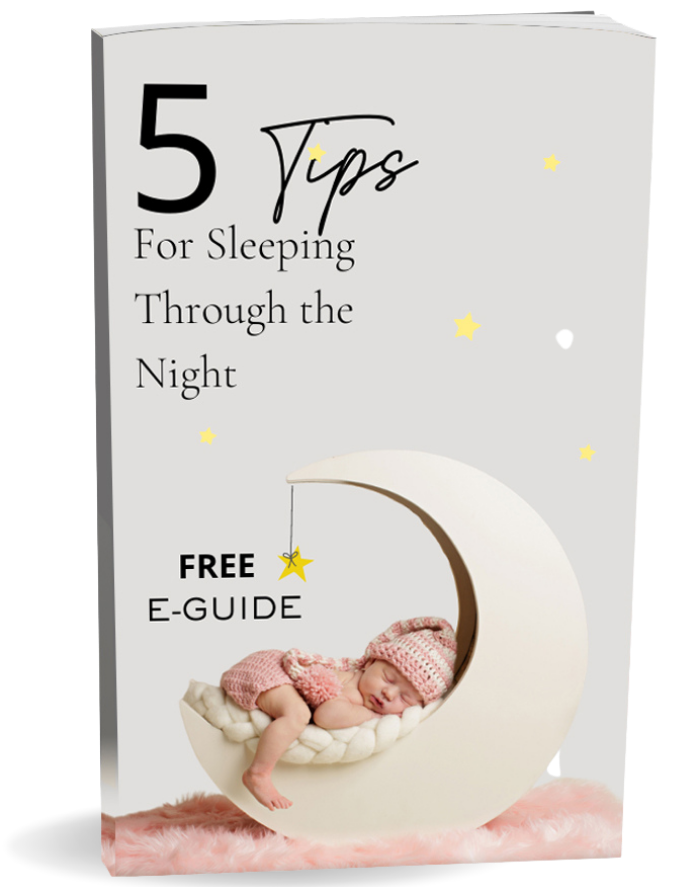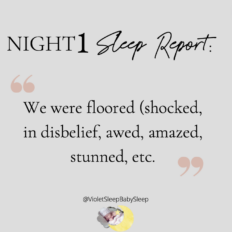
Hey there, tired parents! We all know sleep is crucial for our little ones, but figuring out exactly how much sleep they need (and when!) can feel like a mystery. Let’s break it down, stage by stage, so you can understand what to expect and how to create the best routine for your baby or toddler. So let’s talk age appropriate sleep times for babies and toddlers — including the sleep needs, recommended schedule, and nap times!
Let’s get you and your baby some well-deserved sleep. And, all of these suggestions are based on my years of experience as an R.N. and an expert baby sleep consultant.
Age Appropriate Sleep Times for Newborns (0-3 Months)
Sleep Needs: 14-17 hours per day
Typical Schedule: Newborns don’t follow a strict schedule, sleeping in short stretches of 2-4 hours around the clock.
During those first few months, your newborn is still figuring out life outside the womb, and their sleep is all over the place. They sleep when they need to, waking up for feedings and diaper changes, and won’t settle into any specific pattern just yet. You’ll likely see your little one napping 4-5 times a day, and these naps can be anywhere from 30 minutes to 2 hours. Focus on creating a cozy, calm environment and responding to their cues, which will help them feel safe as they slowly start learning the difference between day and night.
Age Appropriate Sleep Times for Infants (4-6 Months)
Sleep Needs: 12-15 hours per day
Bedtime: Between 6:30 pm and 8:00 pm
Naps: 3-4 naps per day, lasting 30 minutes to 2 hours
As infants reach 4-6 months, their internal clocks start to mature, and they begin to follow a more predictable sleep schedule. This is a great age to establish a consistent bedtime routine to help them recognize when it’s time to wind down. A bedtime routine could look like a warm bath, a short story, or some gentle rocking before bed. At this stage, many babies will start to sleep longer stretches at night, though they may still wake for feedings. With a little patience, you can guide your infant toward longer, more consolidated nighttime sleep.
Want a personalized sleep plan for your infant? Check out my baby sleep consultant services here!
Age Appropriate Sleep Times for Older Infants (7-11 Months)
Sleep Needs: 12-15 hours per day
Bedtime: Around 6:30 pm to 8:00 pm
Naps: 2 naps per day, usually lasting 1-2 hours each
Age appropriate sleep times for babies 7 to 11 months old include a two-nap-a-day routine, and their nighttime sleep becomes more regular. Bedtime remains in the early evening, and they may be capable of sleeping through the night without needing a feed. Older infants often thrive on consistency, so keeping their naps and bedtime routine steady can make a big difference.
Self-soothing is another important skill at this age. If your baby tends to wake up briefly in the night, giving them a chance to resettle on their own can help them (and you) get better sleep.
Does your baby’s sleep routine not look like this? Get a sleep consultation to understand why.
Age Appropriate Sleep Times for Young Toddlers (12-18 Months)
Sleep Needs: 11-14 hours per day
Bedtime: Around 7:00 pm to 8:00 pm
Naps: 1 nap per day, typically lasting 1-2 hours
By 12-18 months, most toddlers are ready to transition from two naps to one longer nap in the afternoon. This change can sometimes be challenging, so it may help to ease into it gradually by shortening the morning nap before dropping it completely.
Young toddlers are energetic and need plenty of downtime to help them unwind. At this stage, maintaining a consistent bedtime routine is crucial, as they may begin to resist sleep due to increased independence and curiosity. If your toddler is struggling with the transition to one nap, try an earlier bedtime to help them make up for any lost rest.
Age Appropriate Sleep Times for Toddlers (18-24 Months)
Sleep Needs: 11-14 hours per day
Bedtime: Around 7:00 pm to 8:00 pm
Naps: 1 nap per day, lasting about 1.5-2 hours
For older toddlers, sleep is more predictable, but routines become even more important.
At this age, they’re full of energy and often resist bedtime in favor of exploring and playing (we all know how bedtime negotiations go with a toddler). To help, keep nap and bedtime schedules consistent, even on weekends. You might start noticing signs of “toddler independence,” with bedtime battles or requests for “just one more story.” Giving your toddler choices, like picking out pajamas or a favorite bedtime story, can make bedtime feel like something they’re a part of rather than a task they’re resisting. Staying firm with bedtime boundaries helps reinforce good sleep habits.
If you’re having consistent trouble with your toddler getting to bed, it might be time to get some help!
What About the 2-3 Year Olds?
Sleep Needs: 10-13 hours per day
Bedtime: Between 7:00 pm and 8:30 pm
Naps: 1 nap per day, lasting about 1-2 hours
As toddlers approach two years old, some will start to shorten their naps, while others continue to need the full afternoon rest. Even if your child seems to be moving away from napping, keep a quiet time during the day to encourage rest. A consistent bedtime routine is essential, as is a predictable wake-up time.
Toddlers do often experience sleep regressions or start to develop nighttime fears, so creating a comforting bedtime routine, with a security object like a blanket or stuffed animal, can help them feel secure and ready for sleep.
What About the 3-4 Year Olds?
Sleep Needs: 10-13 hours per day
Bedtime: Around 7:00 pm to 8:30 pm
Naps: If they still nap, expect about 1 hour, often in the early afternoon
By 3-4 years old, many children start phasing out naps altogether, but they can still benefit from quiet time in the afternoon. During this transition, you may notice that bedtime routines become even more important as they resist winding down at night. Introducing a storytime ritual or a few minutes of cuddles before bed can help signal the end of the day. If they resist sleeping or seem overtired, maintaining quiet time or a shorter nap can keep them on track without making bedtime too challenging.
Tips for Every Age
Creating a healthy sleep foundation is a journey that grows with your child. Starting from infancy, a calming bedtime routine and a sleep-conducive environment can make a huge difference. Make sure the room is cool, dark, and quiet, and try using a white noise machine if background noise is a problem.
Above all, be consistent, but flexible. Every child is different, and small adjustments may be needed to keep their routine working smoothly.
And, if you notice that your little one doesn’t fall into these age appropriate sleep times for babies, it might be worth getting a sleep consultation done. A baby sleep consultant can work with you and figure out your individual needs, along with creating a personalized sleep plan. If you’re looking for some help, I’ve worked with hundreds of families. You can check out my services here and book a consultation today!



















